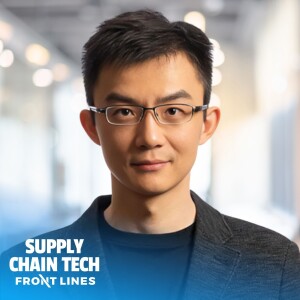
Wednesday Apr 30, 2025
Dr. Xiaodi Hou, CEO of Bot Auto: $45 Million Raised to Bring Profitable Autonomous Trucking to Market
Bot Auto is redefining the autonomous driving industry with a pragmatic, economics-first approach. With over $45 million in funding, the company is positioning itself as a trucking company that leverages autonomous technology, rather than a technology vendor selling autonomous systems. In a recent episode of Category Visionaries, I spoke with Dr. Xiaodi Hou, CEO of Bot Auto, who shared his decade of experience in autonomous vehicles and his vision for creating a profitable business that delivers transportation capacity more efficiently than human drivers.
Topics Discussed:
- Bot Auto's evolution from deep learning applications to autonomous trucking
- The strategic advantages of highway trucking over urban autonomous driving
- Why cost per mile (CPM) provides a better North Star metric than miles per intervention
- Bot Auto's business model as a trucking company first, technology company second
- The industry-wide challenge of rebuilding credibility after years of overpromising
- Projected timeline: 30 trucks by 2026, breakeven with 100 trucks by 2027
- Lessons learned from previous ventures in autonomous driving
- The future impact of autonomous trucking on transportation infrastructure
GTM Lessons For B2B Founders:
- Position as a service provider, not a technology vendor: Bot Auto deliberately positions itself as a trucking company that happens to use autonomous technology, rather than an autonomous technology vendor. "Transportation itself is a service," Xiaodi explained. "Consider us as a trucking company. We are a trucking company, but in near future we will remove the human driver and then we can operate more efficiently than a traditional trucking company." B2B founders should consider whether selling a service that incorporates their technology might be more viable than selling the technology itself, particularly when customers lack the capabilities to implement complex technologies.
- Design for seamless ecosystem integration: Rather than requiring new infrastructure or capabilities from customers, Bot Auto designed their offering to plug directly into the existing transportation ecosystem. "The ecosystem for transportation, for trucking is already there. And if we can be a kind of a painless, transparent replacement like equivalent to a human driven truck and supply the capacity to the ecosystem, then the ecosystem is already there. We don't even need to rebuild the ecosystem," Xiaodi noted. B2B founders should design their offerings to integrate with existing workflows and systems rather than requiring customers to build new capabilities around their technology.
- Choose one definitive metric that drives all decisions: Bot Auto uses cost-per-mile (CPM) as their North Star metric for evaluating all business and technology decisions. "If your cost per mile is too high, no matter how experienced your partner is, or how ambitious you are, or how big your fleet is, if your cost per mile is negative, you will never make money," Xiaodi emphasized. This singular focus creates clarity across the organization. B2B founders should identify a similar "ultimate guideline" that directly ties to profitability and use it to evaluate every investment and initiative.
- Focus on industry-wide credibility, not competition: Xiaodi strongly rejected the notion that autonomous trucking is a competitive space. "The autonomous driving industry is facing the biggest problem that is shared by everyone. That is the credibility of the whole industry. We collectively have promised too much and we have delivered too little," he explained. Instead of positioning against other startups, Bot Auto focuses on rebuilding trust in the entire category. B2B founders in emerging categories should consider how collective credibility impacts their success more than individual positioning against similar startups.
- Create internal-external alignment: Bot Auto ensures perfect alignment between their internal goals and external messaging. "If your internal goal is to do something and your external presentation promises something very different, that always creates a clash of the company. Like basically you will be ending up with two companies under one stock symbol. That's very bad," Xiaodi warned. This alignment principle shapes how they communicate with investors and the market. B2B founders should ensure their internal metrics and priorities match what they promise externally, avoiding the trap of optimizing for different outcomes internally versus externally.
- Use early revenue to discipline innovation: Unlike many deep tech startups with distant revenue horizons, Bot Auto designed their business model to generate revenue relatively quickly. This approach creates what Xiaodi calls a "self-regulation mechanism" that forces practical decisions: "Are you going to increase or decrease the CPM based on your new invention? Sometimes people do develop a flashy technology, but as soon as they realize that they're not going to reduce our cost per mile, then this is bad technology." B2B founders should design business models that generate early revenue to provide market validation and discipline their innovation efforts.
//
Sponsors:
Front Lines — We help B2B tech companies launch, manage, and grow podcasts that drive demand, awareness, and thought leadership.
The Global Talent Co. — We help tech startups find, vet, hire, pay, and retain amazing marketing talent that costs 50-70% less than the US & Europe.
No comments yet. Be the first to say something!